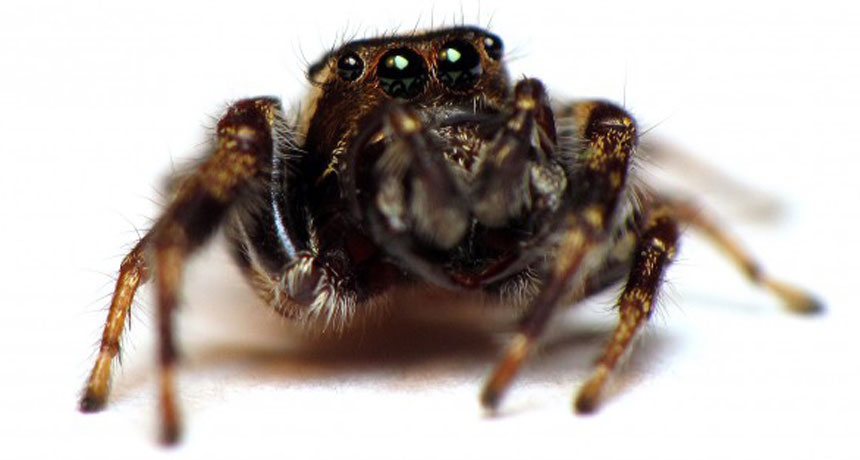Insecticide can change a spider’s personality
Some farm chemicals can alter a spider’s behavior — including how well it captures prey

This male bronze jumping spider eats a common orchard pest: moths. But moth-killing chemicals sprayed in orchards can change the personalities of spiders, the moths' natural predators. This in turn changes the spiders' ability to capture moths.
Crystal Ernst
Spiders have personalities. Like people, some are adventurous. Others are more cautious. And just like us, these personality traits can be affected by exposure to pollutants. A new study finds that a chemical commonly used to kill an orchard pest, a type of moths, did just that. It changed the behavior of a jumping spider — one that normally eats those orchard moths.
The findings appeared in the July issue of Functional Ecology.
Previous studies had shown that more adventurous jumping spiders take more risks. They explore more territory, which helps them find prey. They also are more willing to pounce on prey, which is how they get a meal. Less adventurous spiders stick closer to home and don’t leap on prey as often. These less daring spiders also capture fewer prey.
Why such different behaviors? “It’s because the brain of each spider is different. It’s the same with humans,” says Raphaël Royauté. “That’s why drugs affect some people more than others, or why some feel the effects of alcohol more quickly than others.”
Royauté works at North Dakota State University in Fargo. There he studies the behavior of animals in natural settings. His new study was conducted when he was still at McGill University in Montreal, Canada. There, he looked at the effects a common insecticide, called phosmet (FAAZ-met), on the personalities of bronze jumping spiders.
Farmers use phosmet in fruit orchards to kill a moth that attacks their fruit. Because bronze jumping spiders will dine on the same fruit-destroying moths, those spiders should be a farmer’s friend. But Royauté wondered if the insecticide might have some effect on them.
To probe that, Royauté and his colleagues collected almost 200 bronze jumping spiders. They removed the spiders from three areas where phosmet had not been used. Back in the lab, the scientists tested the predatory animals’ personalities.
In the first test, they put each spider into a container that was 30 centimeters (12 inches) on each side. Lines on the floor of the box created 36 squares. The team then recorded how many squares each spider explored over the course of five minutes. Individuals that visited more of the squares were rated more adventurous.
In a second test, each spider was placed in a Petri dish with a yummy (to spiders, anyway) fruit fly. The researchers then timed how fast it took the spider to turn toward the fly, track it and leap on it — before eating that meal. The faster predators were again rated the more adventurous.
The team repeated each test twice so they could get an average of the results.
Then they exposed half of the spiders to phosmet. One day later, they repeated the exploration and fly-catching tests. Spiders exposed to phosmet no longer acted like themselves.
If they had explored an average of, say, seven squares before being exposed, now some explored a lot more, some a lot less. If they had quickly captured prey before, some pounced on prey more slowly now, while others got their lunch even more quickly.
“They departed from their normal behavior,” explains Royauté. And which effect the chemical had on any individual spider could not be predicted.
These changes, he says, could be an early signal that the insecticide is dangerous to these natural insect-control agents. It could be that a low dose won’t affect the species as a group, he says. But more sensitive individuals might react more strongly. And these new tests provide “a flag for detecting negative effects early.”
Pierre-Olivier Montiglio agrees. He works at University of California, Davis as an evolutionary ecologist. That means he studies how species have evolved over time.
“Raphaël’s results mean that even if pesticides do not kill spiders, they are still very bad for them,” he says. “Pesticides prevent spiders from making clever decisions about what food they should eat or where they should live.”
Behavioral ecologist Jonathan Pruitt works at the University of Pittsburgh in Pennsylvania. He says spiders usually show a specific kind of personality that makes them effective in the environment in which they live.
If pesticides change their personality, it could make it harder for the spiders to survive, he says. That, in turn, “could result in even more insect pests and an even greater need for pesticides,” he worries. “In other words, pesticides could be self-defeating.” If true, both spiders and farmers would pay the price.
Power Words
(for more about Power Words, click here)
behavior The way a person or other organism acts towards others, or conducts itself.
behavioral ecologist A scientist who studies animal behavior in a natural setting.
chemical A substance formed from two or more atoms that unite (become bonded together) in a fixed proportion and structure. For example, water is a chemical made of two hydrogen atoms bonded to one oxygen atom. Its chemical symbol is H2O.
ecology A branch of biology that deals with the relations of organisms to one another and to their physical surroundings. A scientist who works in this field is called an ecologist.
environment The sum of all of the things that exist around some organism or the process and the condition those things create for that organism or process. Environment may refer to the weather and ecosystem in which some animal lives, or, perhaps, the temperature, humidity and placement of components in some electronics system or product.
evolve To change gradually over generations, or a long period of time. In living organisms, the evolution usually involves random changes to genes that will then be passed along to an individual’s offspring. These can lead to new traits, such as altered coloration, new susceptibility to disease or protection from it, or different shaped features (such as legs, antennae, toes or internal organs). Nonliving things may also be described as evolving if they change over time. For instance, the miniaturization of computers is sometimes described as these devices evolving to smaller, more complex devices.
evolutionary ecologist A scientist who studies the evolutional history of species and how they interact with each other. These scientists can study many different subjects, including the microbiology and genetics of living organisms, how species change to adapt, and the fossil record (to assess how various ancient species are related to each other and to modern-day relatives).
insecticide A poison applied to kill insects.
pesticide A chemical or mix of compounds used to kill insects, rodents or other organisms harmful to cultivated plants, pets or livestock, or to unwanted organisms that infest homes, offices, farm buildings and other protected structures.
Petri dish A shallow, circular dish used to grow bacteria or other microorganisms.
predator (adjective: predatory) A creature that preys on other animals for most or all of its food.
prey Animal species eaten by others.







